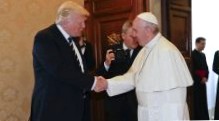
Donald Trump gives the world the cold shoulder: the USA leaves the Paris climate protection agreement. Against the advice of friend and foe. Pope Francis had also come out in support of the agreement.
Almost 30 degrees, the sun blazes down on the roses in the White House garden. A military band makes music. Donald Trump makes world politics. In a firm voice, he says the sentence that many had feared: "The U.S. will withdraw from the Paris climate agreement." The U.S., as the world's largest economy, says goodbye to historic climate deal.
Trump thinks this is good for the United States: "America First!"The U.S. can probably actually only leave the agreement after a lengthy separation process when Trump is possibly already no longer president — after the 2020 election. Millions of jobs would be saved, billions in contributions saved, including to the UN climate fund. "I cannot in good conscience approve a deal that punishes the United States," Trump said.
Decision did not come as a surprise
The move no longer came as a surprise on Thursday; a trend had already emerged in the days and weeks before — even though the White House and the U.S. government were at complete odds within themselves on the ie. On one side, the Reason faction led by Secretary of State Rex Tillerson, supported by scientists, foreign counterparts and business bosses, vehemently advocated staying in the historic agreement. On the other side, the zealots around nationalist Stephen Bannon.
Information has been leaked for days. Trump had invited an illustrious crowd of deniers of man-made climate change when he announced his decision. The Heritage Foundation, an arch-conservative think tank that flatly rejects any kind of climate protection, sent five representatives to the Rose Garden.
Also at his side was Vice President Mike Pence — the face of traditional U.S. Republicans, who are the only major political force in the world that does not believe climate change is a major threat to humanity. In 1986, the Republican icon Ronald Reagan had the solar mirrors that his Democratic predecessor Jimmy Carter had installed thrown out of the White House.
Economists: impact positive only in the short term
The economic benefits for the United States are likely to be limited. Signals were already coming from abroad that market access for U.S. companies would not be possible if they claimed competitive advantages from not complying with Paris. Economists believe that relying on outdated industries with no future, such as coal and oil, will at best bring jobs in the short term — but will lead to a dead end in the long run.
Climate activists, politicians and business leaders from around the world had already made it clear what they thought of the White House decision: Nothing! "We are on the right side of history," EU Climate Commissioner Miguel Arias Canete had tweeted. He did not explicitly say who he thought was on the wrong side, nor did he need to.
The Paris Agreement will also outlast this U.S. policy, Canete stressed. Earlier, several politicians had sent pleading appeals to Washington. "It is crucial that all parties stick to the Paris Agreement," the heads of government of the Nordic countries heavily affected by climate change — Sweden, Norway, Finland, Iceland and Denmark — wrote in a joint last-minute letter to Trump — also to no avail.
Pope Francis: fighter for climate protection
Still in the past week Pope Francis had made himself strong for the climatic protection agreement during his meeting with the US president in the Vatican. As a gift, he had presented Trump with a copy of his environmental encyclical "Laudato si".
In addition to EU politicians, the Vatican had also warned against a phase-out. Bishop of the Curia Marcelo Sanchez Sorondo had spoken of a "disaster for all" in the run-up to the decision. He told the Italian newspaper La Republicca that such a move by the U.S. government would also be a "great shame" for the Vatican itself.
Future uncertain
Whether the Paris Agreement, signed by 195 countries and already ratified by 147 — including the U.S. — will be shaken to its foundations by Trump's move now depends on many factors. One of them is called China, another Russia. China's Premier Li Keqiang ared in Berlin that his country will continue to adhere to the Paris climate agreement in the future.
The Middle Kingdom, the world's largest producer of greenhouse gases even ahead of the USA, had virtually produced itself as a guardian of the world climate during the months of Washington's fickleness — always with its own economic interests in mind.
Russia also wants to remain part of the Paris Agreement. However, the Kremlin also made sounds that are grist to the mill of conspiracy theorists who smell a secret alliance between Trump and Vladimir Putin. Of course, it will be difficult to implement the climate protection agreement if important countries are absent, Peskov said, according to the Interfax agency. That certainly made people sit up and take notice.
"Paris is not dead"
It is already a bitter finding "that a country like the People's Republic of China, a one-party state of an authoritarian nature, is closer to us in climate policy than the United States of America," Martin Schulz, the SPD's candidate for chancellor, said in Berlin. Party colleague and Environment Minister Barbara Hendricks, meanwhile, tried to be demonstratively calm: "Paris is not dead," she said on rbb-Inforadio.
Economists have been telling Trump and his people for months that staying in the climate agreement would make economic sense. "If we fail to build an economy that consumes little carbon, it puts America's prosperity at risk," reads a letter to the president signed by the heads of 600 U.S. companies — including the likes of JohnsonJohnson and jeans maker Levi Strauss.